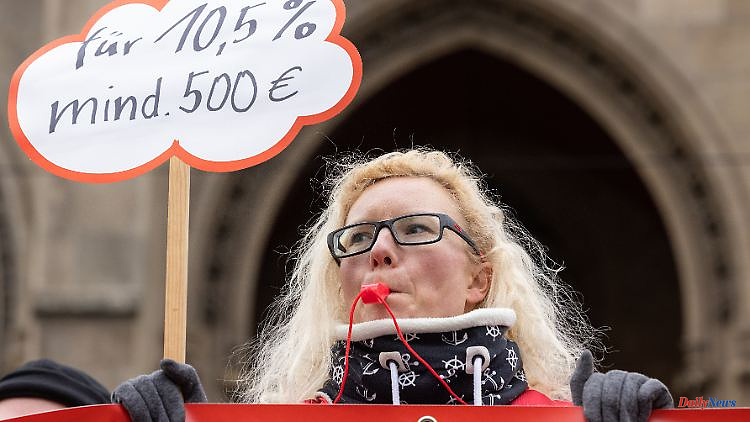Accompanied by warning strikes, Verdi is threatening longer strikes if employers in the public sector fail to submit "substantial" proposals. They are keeping a low profile before the second round of negotiations and accuse the union of unnecessary escalation.
Before the second round of negotiations in the collective bargaining dispute between the federal and local governments, the Verdi union threatened to expand the warning strikes. Union chairman Frank Werneke told the Rheinische Post newspaper that there must be "substantial proposals" to resolve the collective bargaining dispute. "Anything else would be very disappointing and would result in an extension of the warning strikes - especially with regard to the duration." If the negotiations in the third round should fail at the end of March, a ballot could be considered, Werneke said.
The second round of negotiations in the collective bargaining dispute for around 2.5 million public sector employees is planned for Wednesday and Thursday in Potsdam. The general manager of the Association of Municipal Employers' Associations (VKA), Niklas Benrath, left open when there will be an offer from employers. "Whether and when we make an offer or whether we - as in many collective bargaining rounds in the past - come to an agreement without a formal offer depends on the specific course of the negotiations," Benrath told the "Rheinische Post". He accused Verdi of unnecessarily escalating the wage dispute.
In order to increase the pressure, numerous employees in various cities stopped working again on Tuesday. The first effects could be felt in local transport in Hanover, for example: display boards at the stops pointed out that no buses and trains were running. According to Verdi, actions in Lower Saxony should also affect day-care centers and garbage disposal. In Mecklenburg-Western Pomerania, too, many educators and administrative employees followed the call for a warning strike. "We're standing here with around 350 to 400 people on Schwerin's market square," said a union spokeswoman.
In Munich and Stuttgart, confetti and camels from the carnival days could remain on the streets longer: according to Verdi, garbage disposal and city cleaning took part in the warning strikes there. In Saarland, clinic employees stopped working. An emergency staffing has been set up in all areas of the hospitals, said union secretary Lisa Summkeller - emergency care is guaranteed. Operations that could be postponed from a medical point of view were postponed. There were also strikes in Magdeburg and Erfurt, among others.
The warning strikes are to be partially continued on Wednesday tomorrow. In the city of Brandenburg, for example, employees of the Brandenburg University Clinic, the district administrations of Havelland and Potsdam-Mittelmark and the Spree-Havel Waterways and Shipping Office want to lay down their work.
So far, there have been no significant approaches in the collective bargaining dispute. Verdi and the civil servants' association are demanding an increase in income of 10.5 percent, but at least 500 euros more, for employees in the federal government and in the municipalities. This is to prevent high inflation from eating up a large proportion of real wages. The municipal employers reject the demand as economically unmanageable.












